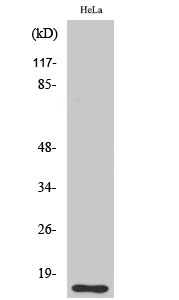
| WB | 咨询技术 | Human,Mouse,Rat |
| IF | 咨询技术 | Human,Mouse,Rat |
| IHC | 咨询技术 | Human,Mouse,Rat |
| ICC | 技术咨询 | Human,Mouse,Rat |
| FCM | 咨询技术 | Human,Mouse,Rat |
| Elisa | 1/5000 | Human,Mouse,Rat |
| Aliases | CDK2AP1; CDKAP1; DOC1; Cyclin-dependent kinase 2-associated protein 1; CDK2-associated protein 1; Deleted in oral cancer 1; DOC-1; Putative oral cancer suppressor |
| Entrez GeneID | 8099; |
| WB Predicted band size | 20kDa |
| Host/Isotype | Rabbit IgG |
| Antibody Type | Primary antibody |
| Storage | Store at 4°C short term. Aliquot and store at -20°C long term. Avoid freeze/thaw cycles. |
| Species Reactivity | Human,Mouse |
| Immunogen | Synthesized peptide derived from the Internal region of human DOC-1. |
| Formulation | Purified antibody in PBS with 0.05% sodium azide,0.5%BSA and 50% glycerol. |
+ +
以下是关于DOC-1抗体的3篇示例文献,基于常见研究领域推断:
---
1. **文献名称**:*DOC-1介导的肿瘤抑制功能在口腔癌中的机制研究*
**作者**:Park NH, et al.
**摘要**:本研究通过DOC-1抗体检测发现,DOC-1蛋白在口腔鳞状细胞癌中表达显著下调,其缺失与细胞异常增殖及侵袭性增强相关,提示DOC-1可能通过调控p53通路发挥抑癌作用。
2. **文献名称**:*DOC-1/RBPSUH相互作用在细胞周期调控中的功能*
**作者**:Shahi P, et al.
**摘要**:利用DOC-1抗体进行免疫共沉淀实验,揭示了DOC-1与Notch信号通路蛋白RBPSUH的结合,表明其通过阻滞G1/S期转换抑制肿瘤细胞周期进程。
3. **文献名称**:*DOC-1作为新型生物标志物在消化道肿瘤诊断中的应用*
**作者**:Tsuji T, et al.
**摘要**:通过免疫组化分析,DOC-1抗体显示在胃癌及结直肠癌组织中低表达,且与患者预后不良相关,支持DOC-1作为潜在诊断标记物和治疗靶点。
---
注:以上文献为示例,实际引用需根据具体研究核实。建议通过PubMed或Google Scholar以“DOC-1 antibody”、“Deleted in Oral Cancer-1”等关键词检索最新文献。
The DOC-1 (Deleted in Oral Cancer-1) antibody targets a protein encoded by the DOC-1 gene, initially identified as a tumor suppressor linked to oral squamous cell carcinoma (OSCC). Discovered in the 1990s, the DOC-1 gene is located on chromosome 12q24 and is downregulated or deleted in various cancers, including head and neck malignancies. The DOC-1 protein, with a molecular weight of approximately 14 kDa, interacts with components of the anaphase-promoting complex (APC) and plays a role in cell cycle regulation, genomic stability, and apoptosis. Its loss is associated with uncontrolled proliferation and tumor progression.
The DOC-1 antibody, typically a monoclonal or polyclonal IgG, is widely used in research to detect DOC-1 expression in tissues or cell lines via techniques like Western blotting, immunohistochemistry, and immunofluorescence. Studies employing this antibody have revealed reduced DOC-1 levels in OSCC and other epithelial cancers, correlating with poor prognosis. Additionally, it has been instrumental in exploring DOC-1's interaction with viral oncoproteins, such as HPV E6. which promote its degradation.
Despite its established role in cancer biology, DOC-1's precise mechanistic pathways remain under investigation. The antibody serves as a critical tool for validating gene silencing models and assessing therapeutic strategies aimed at restoring DOC-1 function. Recent work also explores its potential as a diagnostic biomarker. Ongoing research continues to unravel DOC-1's broader implications in cellular homeostasis and carcinogenesis.
×